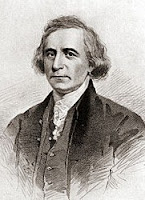Philip Freneau (1752-1832) was an American poet born in New York City, of Huguenot descent, and was graduated from Princeton in 1771, where, with H. H. Brackenridge, he delivered at commencement a poetical dialogue on "The Rising Glory of America." He made mercantile voyages to the West Indies in 1776 and 1780, was captured by the British during the second one, and described his experiences as a prisoner at New York in The British Prison Ship: a Poem in Four Cantos (1781). Other early publications are his Voyage to Boston, a poem (1774), and General Gage's Confession (1775). He was a frequent contributor of patriotic verse to the Freeman's Journal of Philadelphia during the Revolution. After its close he was principally occupied as a shipmaster in the West India trade until 1791, when he was made editor of the National Gazette of Philadelphia by Jefferson. This connection lasted for two years, and he then edited a paper at Mt. Pleasant, N.J., and engaged in other journalistic work for a few years, subsequently returning to a seafaring life and following it until the restrictions on navigation made it unprofitable in 1809. He then resided at his home in Mount Pleasant, N.J. Freneau was the first distinctive American poet, and his verse, though uneven, is characterized by grace, sentiment, and originality.
His books include The Poems of Philip Freneau, Written chiefly during the Late War (1786), Poems Written and Published during the American Revolutionary War (1809), and A Collection of Poems on American Affairs (1815).
